Raksha Bandhan is the festival that celebrates the beautiful bond between a brother and a sister. It is celebrated on Shravan Poornima, which in 2024 falls on Monday, 19th August. The sister ties the rakhi on her brother’s hand with a prayer to make him prosperous, and the brother pledges to protect his sister in every birth. While Raksha Bandhan celebrates the relationship between brothers and sisters, it is also a spiritual bond which helps in reducing the give and take between them and helping them further on the path to God realisation.
Best time to celebrate Raksha Bandhan on 19.8.2024
The Dharmasindhu says that Raksha Bandhan should be celebrated in the afternoon or during the pradosh time on that Shravan Poornima, which does not have Bhadra karana in it.
Note – Vishti Karana is called Bhadra. Karana means half of a Tithi. Bhadra karana is considered inauspicious.
A. On 19.8.2024, Raksha Bandhan can be celebrated in the afternoon (aparahna) or pradoshkaal (time of about two and a half hours after sunset).
B. If it is not possible to celebrate Raksha Bandhan during the aforementioned times, then choose any time after 2 p.m. to celebrate it.
C. On Shravan Poornima this year, there will be Vishti Karana till about 1.33 p.m. Nirnayasindhu warns that celebrating Raksha Bandhan during Vishti Karana will call for destruction. Hence it is forbidden to celebrate Raksha Bandhan before 1.33 p.m. on 19.8.2024.
Celebrate a spiritual Raksha Bandhan
Raksha Bandhan Do’s
Raksha Bandhan Dont’s
A. Place a short wooden seat for the brother to sit on.
B. Draw a sattvik rangoli around this wooden seat (Sattvik waves are emitted by the rangoli designs made in this way and they help in making the environment of the place sattvik.)
C. Have the brother sit on the seat. He should be wearing new clothes. The sister should stand in front of him holding a platter for aukshan. The siblings must first close their eyes and pray to God for each other’s protection.
D. The sister must now apply a tilak of vermillion to her brother’s forehead.
E. She should then tie a rakhi on her brother’s right wrist. (The sister should recite the ‘yena baddho…’ prayer that is given below)
F. After tying the rakhi, the sister must wave the ghee lamp i.e. arti (in a semi-circular manner) in front of the brother.
G. After waving the arti, the brother must gift his sister something. The sister must show her respect for her brother by accepting the gift.
Avoid such rakhis
Nowadays markets are flush with fancy rakhis. Some of them have images of Gods or Dharmik symbols. (Some examples are given below) After Raksha Bandhan, the rakhis are often forgotten and start collecting dust, some fall off and get trampled upon. When this happens with a God’s image, it is gross denigration of that Deity. This will also amount to sin. So, to avoid this, do not tie such rakhis.

History of Raksha Bandhan
A. Goddess Lakshmi made King Bali (from hell) her brother, by tying a rakhi on his wrist and thus freed Narayan (Her husband). This was the day of Shravan Pournima.
B. The Gods and demons were in a war for 12 long years. The demons were on the verge of winning the war. Indra, the king of the Gods was dejected and decided to withdraw from the battlefield. Indrani sensed his dejected and approached Guru Brahaspati for advice. Guru Brahaspati meditated for a while and told Indrani – Use the power of your fidelity, pray for Indra to be protected and tie a thread on his right wrist. He is sure to be victorious. Indrani followed the instructions and tied a thread while reciting the following shlok – येन बद्धो बली राजा दानवेन्द्रो महाबलः । तेन त्वाम् अभिबध्नामि रक्षे मा चल मा चल ।। (yena baddho balī rājā dānavendro mahābalaḥ । tena tvām abhibadhnāmi rakṣe mā cala mā cala ।।) Meaning : I tie the same fragile thread which bound the all powerful King Bali to your hand. May this thread stay intact and protect you.
C. As stated in the Bhavishya-Puran, Rakshabandhan was originally meant for Kings. A new custom of tying rakhis began from the historical ages.
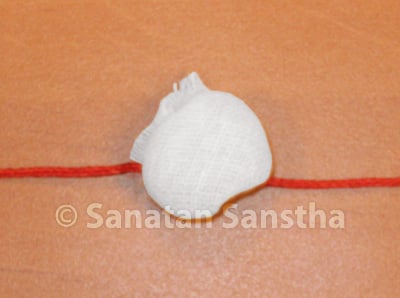
A historical rakhi
This is a small bundle of rice grains, gold, and white mustard seeds tied together with a silk thread.
Spiritual science underlying the tying of a rakhi
Increase in love and decrease in give and take account
The give-and-take account between siblings is approximately 30%. This account is lessened through the medium of festivals like Rakshabandhan; hence, though the siblings get entangled at the gross level, at the subtle level the existing give-and-take account between them is settled.
Spiritual perspective : To bind the waves of the Yama Principle

On the day of Shravan Pournima high speed waves of Yama Principle are activated in the universe. Particles of the Tejtattva are generated due to the friction between these high speed waves. These particles of Tejtattva are emitted into the atmosphere. They become inert because of their union with the earth particles and they create a covering on the ground. This is called raksha.
Emotional perspective : To nurture a healthy relation between siblings
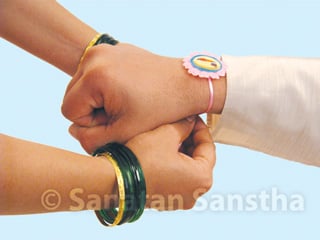
The sister is supposed to tie a rakhi on her brother’s wrist. The emotion in this is that the brother should become prosperous and he should protect his sister. More important than a sister tying a rakhi to her brother, is a young man getting a rakhi tied from a young woman. By doing so, the attitude of men towards women changes. It is a sort of a religious observance that the youth can follow. All sinful thoughts cease to exist before the pure bond of love between a brother and sister. This is also a festival that closes the chasms that are opening up in homes.
Subtle knowledge about Raksha Bandhan
Read the spiritual significance of Raksha Bandhan in this article
Reference book
This article on Raksha Bandhan contains excerpts from the following publication. Get your copy today and learn about our various festivals and how to celebrate them in a spiritually beneficial manner.


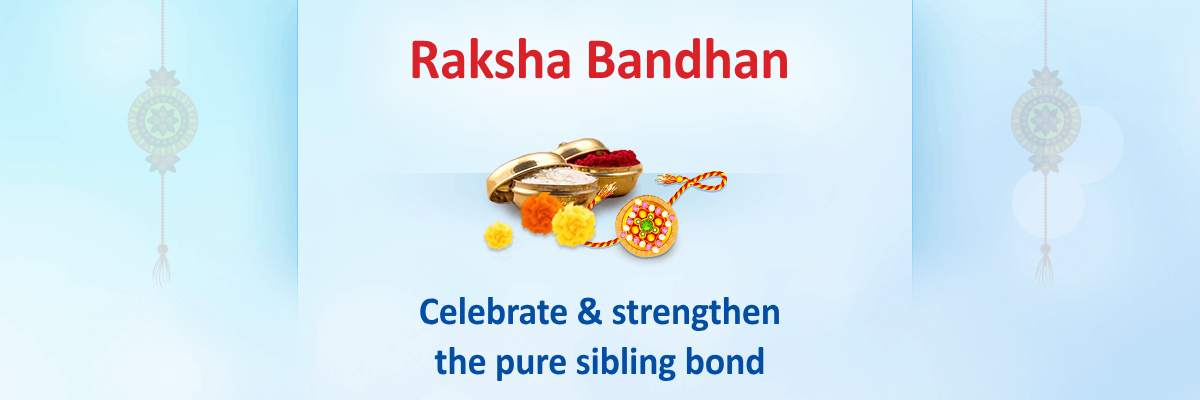
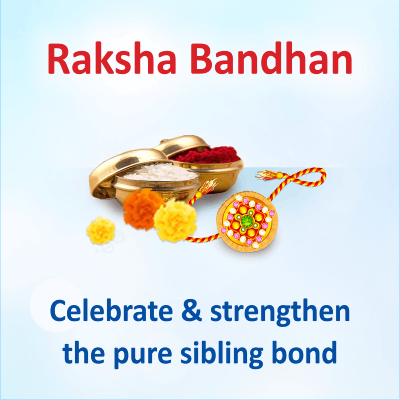

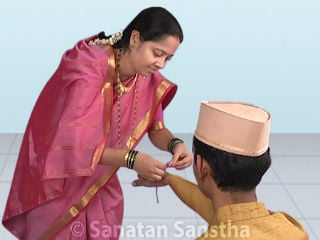
 Nariyal Poornima (Pournima) and Shravani
Nariyal Poornima (Pournima) and Shravani
Thanks for sharing such knowledge about our tradition, keep posting for us.
when should Rakhi be removed after Rakshabandhan
Namaste Ayush ji
We are yet to come across any guidelines in the scriptures as to when the Rakhi can be removed. Most people either remove it as per existing traditions in the family, or on the Amavasya that follows Rakhi Poornima, or they wear it till the Rakhi wears out. You may choose any of these options.
Warm regards,
Sanatan Sanstha